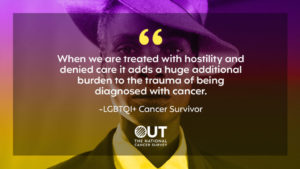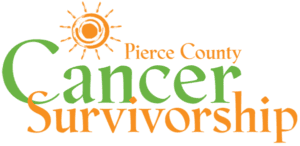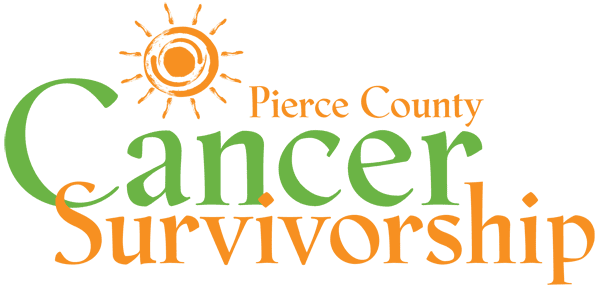Despite a sharp increase in demand for LGBTQI+ trainings for medical providers, there are fewer resources documenting the types of experiences this set of communities encounters. Knowing that some of the most frequent consumers of health care are people diagnosed with cancer, the National LGBT Cancer Network is launching a new survey, Out: The National Cancer Survey, with the goal of informing cancer care for the LGBTQI+ population.

“We ran a smaller scale survivor survey years ago and the insights were profound, people telling us how their families would shun them, how they had to drive miles out of their way to find a welcoming provider, how their partners weren’t really made to feel welcome. This time we hope to get a larger and more diverse group of respondents, to really get a picture of what healthcare is like for our people right now,” says Scout, the executive director of the National LGBT Cancer Network and principal investigator for the study.
There is evidence to show LGBTQI+ people are not only at increased risk for cancer but also may experience worse outcomes. Recent CDC analysis shows LGB people use tobacco at rates 50 percent higher than the general population; and tobacco use is highly correlated with many cancers. Similarly, another study shows trans people are much less likely to have cancer screenings. And others show different subsets of the LGBTQI+ communities have worse survivorship outcomes than non-LGBTQI+ persons.
The Center for Black Equity is a major partner for this study. “Too often my community is not represented adequately in research, but our experiences are not the same as others, we need to elevate and explore those differences.” says President/CEO Earl D. Fowlkes, Jr.
One project goal is to receive enough responses to publish a report on the experiences of Black and Brown LGBTQI+ cancer survivors.
“As a bisexual woman of color, I was already feeling peripheral in society, and a breast cancer diagnosis merely added to my sense of isolation.” says Denise Batts, a member of the study Advisory Board. “Hopefully, the results of this survey will raise awareness and sensitivity among health care providers, and will smooth the difficult path for LGBTQ+ cancer patients.”
An estimated 81,000 LGBTQI+ people are diagnosed with cancer every year. Despite acknowledged health disparities, there are few tailored resources for this population.
“We want to use these findings to educate healthcare professionals, and show that as a whole, we are not adequately caring for this population. We need to do better for our LGBTQI+ patients diagnosed and living with cancer,” says Jason Domogauer, M.D., Ph.D. resident physician in the Department of Radiation Oncology at NYU., also a member of the study Advisory Board.
The study is open to any LGBTQI+ person over the age of 18, living in the U.S., who has received a cancer diagnosis. The study will be recruiting new participants through the end of the year. The report on the findings is anticipated to be published in Spring 2021.
Those interested in taking the study can access it at https://bit.ly/3gHT2en, organizations and healthcare providers interested in becoming a promotion partner should email info@cancer-network.org.

